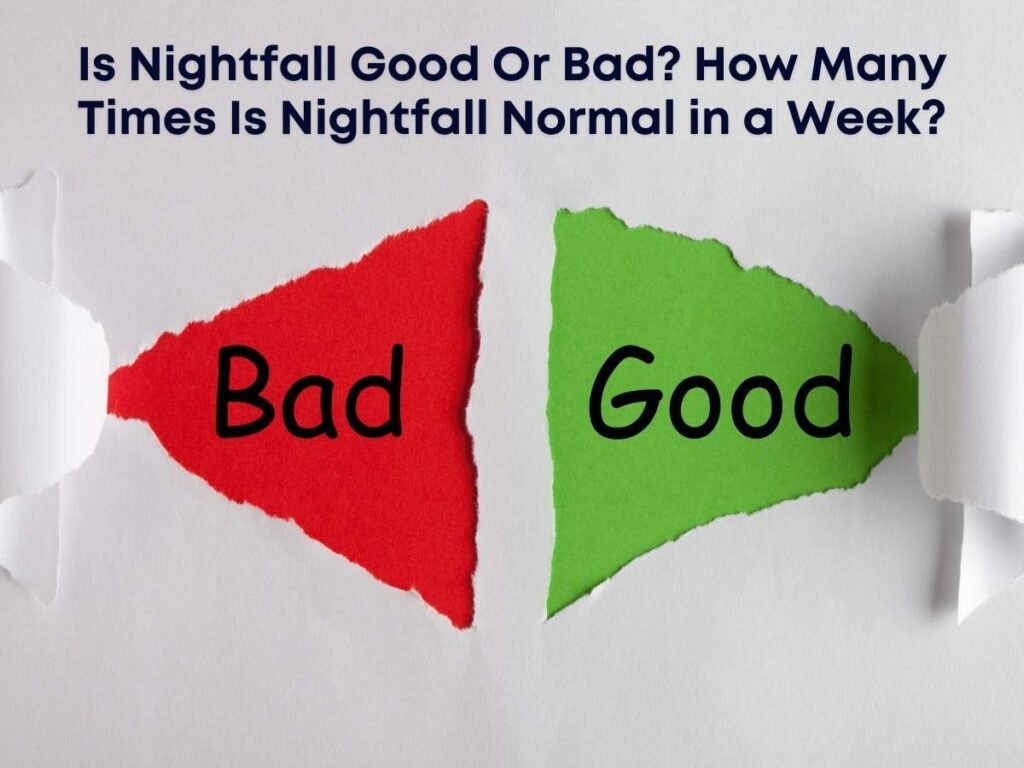Is Nightfall Good Or Bad? How Many Times Is Nightfall Normal in a Week?
Nightfall, or nocturnal emissions, is an experience many people have without understanding. It is typically considered an embarrassing, sometimes confusing occurrence in adolescence and early adulthood. Although it is so common, many myths and stigmas have surrounded nightfall. By examining the process’s biological, psychological, and cultural aspects, we might take a more knowledgeable and compassionate look at it. This blog explores the science of nightfall, what this means in terms of our health, and explains how one could handle the experience if it ever becomes a cause of concern. What Is Nightfall, and Why Does It Happen? Nocturnal emissions or wet dreams, also known as nightfall, are just the involuntary ejaculation of sperm in sleep. It is a purely physiological phenomenon, especially among men, although some women have reacted this way. Research in the Journal of Adolescent Health reported that by age 20, 83 percent of men experience nocturnal emissions. The frequency and occurrence vary widely, although it usually peaks during adolescence. Nightfall usually occurs during puberty and young adulthood, when the body’s hormonal level is at its maximum. But why does it happen? To answer that, we need to understand nightfall’s biological and psychological processes more extensively. Biological Mechanisms of Nightfall 1. Hormonal Activity The onset of nocturnal emissions involves several hormonal activities. Puberty is a time of increasing testosterone levels that will alter the physiology of the body to an increased sexual drive. In addition, seminal fluid production increases at puberty. This creates a periodic release needed to avoid discomfort to the body and the reproductive organs’ health. Hormonal changes, even after entering adulthood, affect sexual health. Such hormonal changes and other physiological factors can trigger involuntary nocturnal emissions. For some, this may continue into their late teens and early twenties. 2. Neurological Triggers Most cases of nightfall occur during the Rapid Eye Movement (REM) sleep. REM sleep is characterized by high brain activity and vivid dreams. During this stage, the brain is highly active and often processes emotions and desires, including sexual thoughts. These subconscious mental processes can lead to sexual arousal, which results in involuntary ejaculation. While REM is incorporated into nocturnal emissions, the parasympathetic nervous system also plays a role. This system controls involuntary body functions, such as regulating heartbeats, digestion, and sexual arousal. As the body becomes saturated with deeper sleep, the system is heightened, and the possibilities of nocturnal emissions increase. 3. Regulation of the Reproductive System Physiologically, nightfall controls the reproductive system. The body periodically cleans out extra seminal fluid to maintain balance and prevent accumulation, preventing the reproductive organ from malfunctioning. Failure to discharge seminal fluid regularly can result in discomfort or even complicated diseases such as prostatitis. Nightfall is the body restoring normal balance in the reproductive organs. The body flushes out excess fluid so as not to store more than is needed. Also Read: Do Women Have Nightfall Too? Surprising Facts About Wet Dreams in Females Psychological Aspects of Nightfall The biological aspect is of importance; however, there are psychological implications that must be seen as well. According to research at the Kinsey Institute, the frequency of nocturnal emissions is significantly higher in males aged 14 to 17 years and is said to decrease after attaining sexual maturity. For others, the experience of nocturnal emission is accredited to repressed thoughts and emotional anxiety because of the multifaceted aspect of sexual growth. Processing Emotions Nightfall can be an emotional outlet through which people cope with unconscious thoughts and desires. Such sexual arousal that leads to nightfall may not be conscious but comes from emotions or desires one has not consciously recognized. Stress, unresolved feelings, or repressed desires come out during REM sleep in the form of involuntary sexual release. For others, nightfall may provide much-needed relief from emotional tension. Unconscious emotional releases may regulate stress and even mental well-being. Developmental Milestone Nightfall is part of sexual maturity and development. For young people, it can occur as their bodies adapt to the deluge of hormonal shifts. Understanding that nightfall is a part of this process can alleviate anxiousness, confusion, or even embarrassment about what’s happening. Nightfall often marks the body’s progress as normal; to many, it is a rite of passage to adulthood. However, societal and cultural stigmas usually make it hard for people, especially young men, to see nightfall as usual and healthy. Also Read: Does Nightfall Effect Muscle Growth, Testosterone, and Face Glow? Is Nightfall Good or Bad? There is a common misconception that nightfall is labeled as good or bad. It’s much more complex than that and largely depends on context, frequency, and an individual’s emotional experience. Possible Positive Effects of Nightfall 1. Physiological Control As discussed earlier, nightfall is a natural process that helps the body flush out excess seminal fluid. Regulating fluid balance is essential for reproductive health. It ensures that the reproductive system functions optimally while maintaining the prostate’s health. 2. Psychological Release For some, nightfall is an emotive release. Whenever emotions stress a mind or when repressed desires during the day express themselves at night, nightfall also releases these pent-up emotions. For people with subconscious tensions, it soothes the mind to cope with emotions. 3. Hormonal Balance Nightfall may help regulate hormonal balance, especially in youths with incredible hormone surges. Repeated nocturnal emissions drain excess testosterone and seminal fluid from the system, which might otherwise lead to some form of physical or psychological distress. Negative Side of Nightfall 1. Psychological Discomfort Cultural myths surrounding nocturnal emissions also make individuals feel guilty and ashamed. In some cultures, nocturnal emissions are perceived as bad, and people feel anxious or embarrassed when they occur. It’s alarming if people associate nocturnal emissions with failure or immorality. 2. Physical Fatigue Recurrent nightfall, especially when it influences the sleep timetable, can lead to somatic fatigue. Nightfall is not harmful; however, if it occurs at night and nightly, it may interfere with rest, decreasing energy and overall well-being. 3. Social and Cultural Stigma Nightfall is a phenomenon that is accepted










